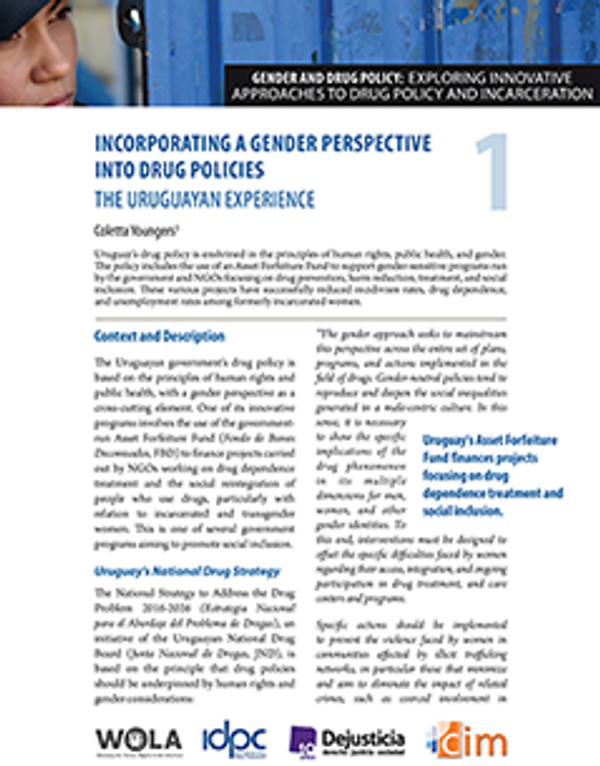Genre et politiques des drogues : Des approches innovantes en matière de politiques des drogues et emprisonnement
IDPC, WOLA et Dejusticia publient une série pour partager des exemples d'approches innovantes qui incorporent une perspective de genre, ainsi que les principes de santé publique et de droits humains, aux politiques des drogues. Pour en savoir plus, en anglais, veuillez lire les informations ci-dessous.
Abonnez-vous à l'Alerte mensuelle de l'IDPC pour recevoir des informations relatives à la politique des drogues.
Across the Americas, drug policies have failed to make a significant dent in the drug trade, while corruption and organized crime continue to thrive. At the same time, these harmful drug policies disproportionately fall on the most vulnerable, including poor women who often enter the drug trade because of desperation, lack of opportunity, and coercion. Stuck in a vicious cycle, the incarceration of these women only heightens their situation of vulnerability and takes a toll on their families and communities.
Global Innovative Approaches highlights various programs and legal reforms from around the world that promote more effective and humane drug policies. The examples include alternatives to incarceration for low-level, non-violent drug offenders, policy reforms, and health and social programs. Many of the briefs analyze programs specifically tailored toward women in conditions of vulnerability. While the details of each approach vary, their goal is to reduce incarceration rates, protect human rights, address public health concerns related to drug use, and assist individuals in transitioning back into their communities after their release.
Each Innovative Approach includes background information and a description of the program or reform, in addition to a section detailing outcomes and results. It is important to note, however, that while some of the approaches highlighted in this series have gone through rigorous review processes, others lack the resources to carry out formal evaluations. Despite this reality, the examples put forward in this series have all shown promise in their results.
While these programs are promising, they should not come at the expense of broader drug policy reform. Yet, in the absence of more comprehensive reforms, these innovations can assist communities caught up in vicious cycles of poverty, social exclusion, drug use, involvement in the drug trade, and incarceration.
Keep up-to-date with drug policy developments by subscribing to the IDPC Monthly Alert.
Téléchargements
- 1. Incorporating a gender perspective into drug policies: The Uruguayan experience
- 2. Reducing female incarceration through drug law reform in Costa Rica
- 3. Costa Rica's inter-institutional network in support of women caught in the criminal justice system
- 4. The 2008 national pardon: Reducing female incarceration in Ecuador
- 5. Two steps forward, one step back: Proportionality of sentencing in Ecuador
- 6. Organizing for the incarcerated and their families: The case of ACIFaD in Argentina
- 7. JusticeHome: Breaking barriers and helping families via alternatives to incarceration
- 8. Diversion from the criminal justice system: The LEAD program in the United States
- 9. Women organizing to protect their human rights: Project SAFE in Philadelphia, United States
- 10. An alternative to pre-trial detention: The New York City Supervised Release Program at Rickers Island
- 11. Ban the Box: Reducing the harmful effects of criminal records in the United States
- 12. The Portuguese model for decriminalizing drug use
- 13. Ensuring more proportionate sentences for female drug offenders in the United Kingdom
- 14. Eliminating barriers to re-entry: Criminal record reform in Costa Rica
- 15. Metzineres: Sheltering and empowering women who use drugs, survivors of violence
- 16. The “SÜTIK” program: Supporting and empowering people who use drugs in Estonia
Sujets
Régions
Profils associés
- International Drug Policy Consortium (IDPC)
- Washington Office on Latin America (WOLA)
- Inter-American Commission of Women (CIM)
- Dejusticia
